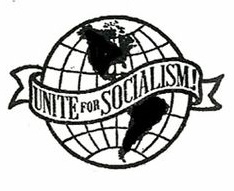If we want to improve things we are going to have to act for ourselves. We're going to have to organise democratically to bring about a society geared to meeting human needs, not profits. But production for use (not profit) is only possible on the basis of genuine common ownership and democratic co-operation - what we call socialism.
This kind of society may seem like a million miles away, but remember we already have the resources and technology to make it possible! After all, this is a world of plenty. What prevents us from enjoying it is class division. Under capitalism, only a tiny minority of the world has ownership and control over the economy. The vast majority of us have nothing except our ability to work which we are then obliged to sell to the minority.
WE are the ones who create all wealth in society - but then we hand it over to the minority, the capitalist class!
One World. One People
We have a world to win. The Socialist Party cannot bring this about on your behalf, and we're not promising to. As workers ourselves all we promise is to play our part in bringing about a sane and rational democratic society where we collectively make the decisions that affect us without needing to worry about how to pay. A society where meeting our needs is the only priority!.
The Socialist Party
What happens locally depends mainly on what happens in the country and even in the world. That is why socialists are working for a different world. But it can't happen unless you join us. The job of making a better world must be the work of all of us.
Since 1904 The Socialist Party has completely opposed the idea of leadership; has rejected all forms of nationalism and advocated a world without borders; and has opposed both the phoney 'socialism' of the Labour Party and the state-capitalist dictatorship of the Soviet Union.
The world we want is one where we all work together. Co-operation is in our interests and this is how a socialist community would be organised - through democracy and through working with each other.
To co-operate we need democratic control not only in our own area, but by people everywhere. This means that all places of industry and manufacture, all the land, transport, shops etc. should be owned in common by the whole community. That way we could all enjoy free access to what we need without the barriers of buying and selling.
FOR A WORLD OF GENUINE COMMON OWNERSHIP AND FREE ACCESS!
An End To Pessimism
We, in the Socialist Party, reject the view that things will always stay the same. We CAN change the world. Nothing could stop a majority of socialists building a new society run for the benefit of everyone. We all have the ability to work together in each other's interests.
All it takes is the right ideas and a willingness to make it happen.
Politicians are fond of telling us that we must take responsibility for our own lives and that we must see to it that our world is a fit place for our children to grow up in. I’ll not disagree with that, but what I will ask is how can we seriously do anything about it when the real decisions are not in our hands? Because of the way things are organised at present, none of us are allowed to take part in the really important decisions that affect us – the ones about our schools, about health and housing, peace and pollution and the distribution of wealth. We are no more consulted on the closure of schools or the selling of council properties to private landlords than we were consulted on the decision to invade another country.
What the Socialist Party suggests as the alternative to this insane set up is a truly democratic society in which every person has a free and democratic say in the decisions that affect them – a society without leaders and the led.
In such a society, people would co-operate to run all of the world’s natural and industrial resources in their own interests, freeing production from the artificial constraints of profit and establishing a system of society in which each person has free access to the benefits of civilisation.
Today we have the technology, the resources and the know-how to satisfy everyone’s needs. That fact is well established. However, we cannot utilise society’s assets sensibly because of the profit-driven requirements of the market-system.
In a society in which the fundamental need of production is profit, our needs come a poor second. The profit system exerts such an influence in society that it impinges upon every aspect of our lives, and you’d be hard pressed to think of some service or product that is not balanced against cost – something to muse on whilst waiting for the bus, the police or visiting the local shops.
You may consider that the society outlined sounds nice, but that socialists are demanding the impossible. All we are asking is that you think for yourselves, value yourself and your fellows higher; expect more for your children and grandchildren. Is it not the case that our world would be a better place to live in if we each had a real democratic say in the decision-making process and real control over the means and instruments for producing and distributing the things we need to live in comfort? Is it not high time that we took back control of our destiny from the profit mongers and their lackeys in power?
Voting for socialism is a step in the right direction and at last puts the ‘real issue’ on the political agenda.
At the end of the day it is up to you as a member of the waged class. It is up to you to decide whether you favour the present system or the rationally organised system we call socialism.
If you agree, if you think we are each capable of cooperating to run a society of free access in our own interests – but only if you agree – then vote for socialism and yourself.







